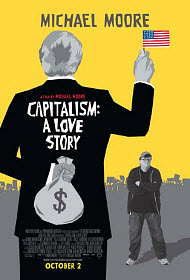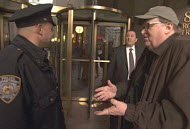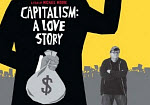Capitalism: A Love Story
 for some language.
for some language.
Reviewed by: Spencer Schumacher
CONTRIBUTOR
| Moral Rating: | Average |
| Moviemaking Quality: |
|
| Primary Audience: | Adults Teens |
| Genre: | Documentary |
| Length: | 2 hr. 7 min. |
| Year of Release: | 2009 |
| USA Release: |
September 23, 2009 (limited—4 theaters, NYC/LA) October 2, 2009 (wide—1,000+ theaters) DVD: March 9, 2010 |
| Featuring |
|---|
| Michael Moore |
| Director |
| Thora Birch (Herself), William Black (Himself), Jimmy Carter (Himself—archive footage), Elijah Cummings (Himself), Baron Hill (Himself), Marcy Kaptur (Herself), John McCain (Himself—archive footage), Michael Moore (Himself), Sarah Palin (Herself—archive footage), Ronald Reagan (Himself—archive footage), Franklin Delano Roosevelt (Himself—archive footage), Arnold Schwarzenegger (Himself—archive footage), Wallace Shawn (Himself), Elizabeth Warren (Herself), George W. Bush (Himself—archive footage)—uncredited), Nancy Davis (Herself—archive footage—uncredited), Martin Luther King (Himself—archive footage—uncredited), Helmut Kohl (Himself—archive footage—uncredited), Bela Lugosi (Himself—archive footage—uncredited), Barack Obama (Himself—archive footage—uncredited), Robert Powell (Jesus—archive footage—uncredited), Joseph Stalin (Himself—archive footage—uncredited) |
| Producer |
| Dog Eat Dog Films, Overture Films, Paramount Vantage, The Weinstein Company, Kathleen Glynn, Anne Moore, Michael Moore, Bob Weinstein, Harvey Weinstein |
| Distributor |
| Overture and Paramount Vantage |
There are undoubtedly many who sympathize with the sentiments of a Wall Street executive when being asked to explain ‘what a derivative is’ replied that he wished that Michael Moore would not make ‘any more movies.’ However, if Moore were to submit to this critique it would be a loss to film audiences, because whether or not you agree with the messenger, the message of Moore’s “Capitalism: A Love Story” is one that should be heard and pondered.
Coming out on the 20th anniversary of Moore’s groundbreaking documentary “Roger & Me” Moore once again proves himself to be provocateur as he takes on the topic of Capitalism and questions its values to an American democracy. Though the title is provocative (as well as facetious), this work is definitely a work of passion for Michael Moore. The benevolence and immorality of Capitalism will be debated far beyond the theatrical run of this film, however Moore proves himself once again to be an entertaining and insightful story-teller and filmmaker.
The question at the center of the film is “What is the price America pays for its love of Capitalism?” To answer that question Moore, as he always does, throws out statistics, data and historical timelines to show America’s economical and political shift over the last 50 years and correlates it to rising rates of society’s blemishes such as loss of jobs, the rise in poverty and the growing divide between the wealthy and the destitute.
It is when Moore delves into the personal narratives of families that have suffered huge economic catastrophes and injustices that Moore shows his strength as a filmmaker. The first person stories paint a clear picture that go beyond any colorful statistics or data.
Moore talks to people who have suffered in the hands of the system either by economic downfalls, blatant injustice, or corporate fraud. When hearing these first person narratives one can not help but wonder why these stories are not reported on the network news.
The argument that will get Christians riled up either in favor of or in vehement opposition to this film is the question of whether Capitalism and Christianity are compatible. Moore speaks to two Catholic priests and an Archdiocese from his hometown of Flint, Michigan, and their opinions of Capitalism with regards to the teachings of Jesus may surprise Christian viewers.
With his previous films, Moore has received his fair share of criticism for being liberally biased as well as using editing and interviewing techniques that at best skewer the argument to Moore’s point of view and at worst manipulate the ‘truth.’
Those who raise these arguments will undoubtedly find much to object to in the way that Moore presents his arguments and underscores them with ‘tongue in cheek’ commentaries. In juxtaposing footage of 50’s industrial films espousing the virtues of Capitalism with scenes of modern day disasters, Moore uses a style of critique that he has become famous for, but opens him up wide for criticism by his many, mostly conservative, critics.
In examining the faults of Capitalism, Moore is relatively even-handed on where blame should be placed, especially when compared to some of his former films. Though a good portion of the blame is placed squarely at the feet of the Bush Administration, the Democrats do not escape unscathed as Moore points the finger at Clinton and many fellow Democratic Congressmen in getting us into this financial crisis. Nancy Pelosi and other dems are highly implicated in the events that lead to the U.S.’s current financial recession.
Objectionable Material
The film is surprisingly rated “R” for language. Though there a couple ‘f’ bombs in the picture, the whole movie consists of less than half-a-dozen profanities. The little profanity that the film does have comes out of the mouth of a Peoria man who is being evicted from his family home and his colorful language is directed at the enforcers of the eviction notice. Moore himself drops a couple of expletives, including one of the aforementioned ‘f bombs.’ In comparison to many PG-13 movies that seem to use swear words as a decency barometer in trying to gage how many words it will take to move from PG-13 to R, the level of profanity is relatively minor.
Of course, the factor that will most determine the level of offense to a viewer of this film (or any Michael Moore film) can be directly correlated to how much you agree with the messenger; as well as one’s political persuasions. Yes, Moore is unapologetically a democrat (small ‘d’) and definitely has liberal leanings. If one is inclined to be offended by criticism of the country and its economic system than one will definitely be offended, but knowing the type of man he is and the types of films he has made, this should be of little surprise.
Moore will probably not win a whole lot of new converts to his personal brand of philosophy, however he does pose some relevant questions that audiences (particularly audiences that espouse the teachings of Christ towards the poor—Ps. 140:12; Luke 6:20-21; James 2:5; Luke 3:11) should hear and discuss.
If you are one of the many critics of Moore’s films, because you disagree with his point of view or simply do not like him, you might find that with the spiritual and moral questions he is asking, that this film is a little more palatable. You might want to give yourself the opportunity to form an informed opinion of this movie by having seen it.
‘Capitalism: A Love Story’ is one of Moore’s most personal and passionate works of cinema, thus far. Though Moore does a better job at placing blame on both sides of the political aisle, Moore is more interested in starting a revolution than continuing the blame game, and since when has a revolutionary worried about objectivity?
Violence: None / Profanity: Moderate / Sex/Nudity: None
Editor’s Note—see articles: How Goldman Backed Moore’s “Capitalism” Movie (off-site)
Fact-checking Moore’s “Capitalism” by Rachel Beck, Associated Press
See list of Relevant Issues—questions-and-answers.







